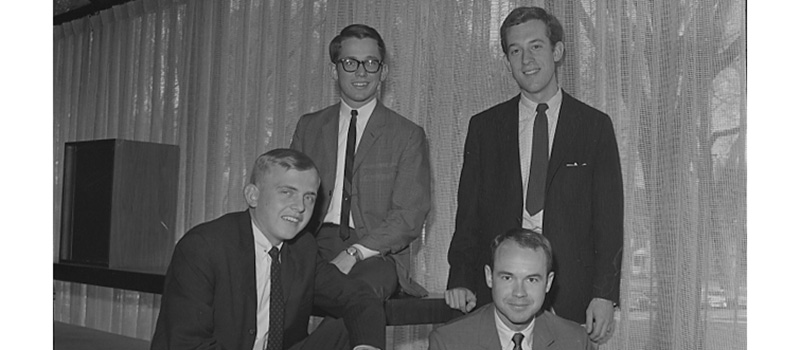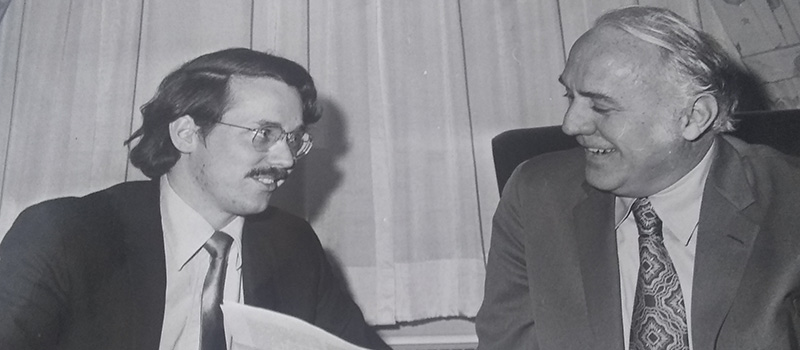House gift from 1980s will benefit future Grinnellians
July 14, 2021 — In a 1979 fundraising letter to his classmates, Stephen Kent ’67 wrote that “when we give to Grinnell, we are not giving in memoriam. We are looking to the future, not to the past.”
Thirty-two years after Kent died, his words continue to ring true, especially in light of Kent’s decision in the late 1980s to gift his home to Grinnell College.
Kent set up a Retained Life Estate gift in his will, which allowed his partner Niels Nielsen to live in the Maryland home as long as desired. When Nielsen moved to Florida recently, it trigged the sale of the home. The College will eventually receive an unrestricted gift of almost half a million dollars from the sale.
 Steve Kent ’67, top left, poses in a 1966 photo with other student leaders on campus, including Dan Bucks '67 and David Hume '67.
Steve Kent ’67, top left, poses in a 1966 photo with other student leaders on campus, including Dan Bucks '67 and David Hume '67.
“It was a very generous thing for him to do,” Nielsen says. “Steve enjoyed where he went to school and was a very active alumnus.”
Many Grinnell alumni from the past three decades are familiar with Kent’s name because of the Stephen K. Kent ’67 Memorial Senior Class Gift. Recognizing the importance and value of giving to Grinnell, Kent started the senior gift challenge in 1988 when he was a class fund director and a director with the Grinnell Alumni Association (the forerunner to the Alumni Council).
Kent introduced seniors to Grinnell’s tradition of generous giving and pledged an additional $5 to the annual fund (now the Pioneer Fund) for every graduating senior who participated in the 1988 Senior Class Gift. It was renamed the Stephen K. Kent ’67 Memorial Senior Class Gift after Kent’s death in 1989. In recent years, the Alumni Council has offered a dollar-for-dollar match for every senior who makes a gift to Grinnell through the senior class gift.
Nielsen is happy Kent’s name continues to be associated with philanthropy three decades later.
“Steve was a generous person,” he says. “He volunteered with his church and drove people around in his van. He really cared about people and helped them in any way he could.”
Kent studied history at Grinnell and was a leader on campus. He served as president of the Student Senate and was Rawson Hall vice president. In the summer of 1965, he earned a Program in Practical Political Education (PPPE) summer congressional internship, foreshadowing his future career.
After graduation, Kent earned a law degree from the University of Chicago. He stayed active with Grinnell serving as vice president of the Chicago Area Alumni Club, annual fund class chairman, and later as an admission representative.
Kent moved to Washington D.C. in 1972 and worked as a legislative aide to U.S. Rep. George M. O’Brien of Illinois. He later spent two years working with ACTION: The National Volunteer Agency. In 1978, he begun a job as a congressional affairs officer in the U.S. Nuclear Regulatory Commission. Nielsen, who met Kent in 1977, said he loved working as a congressional liaison.
 In this 1973 picture, Kent, left, looks over paperwork with Rep. George O’Brien. Kent worked as a legislative aid for the Congressman in the early 1970s.
In this 1973 picture, Kent, left, looks over paperwork with Rep. George O’Brien. Kent worked as a legislative aid for the Congressman in the early 1970s.
Kent moved into the Silver Spring, Maryland, house in 1987. The 1,400 square-foot, 3-bedroom house was originally built in 1940, Nielsen says. At one point, Kent had second-thoughts about giving it to Grinnell, thinking instead he could leave it to Nielsen.
“I said leave it the way it is,” Nielsen recalls. “It should go to Grinnell. I don’t have family, so there would have been no one else for me to give it to. I don’t think his parents were happy with the decision at the time, but it was his wish to support the College.”
A Retained Life Estate gift is when the owner of a personal residence donates that property to a school or charity, retaining the right to use the property for the rest of their family’s lives. The tenant retains full use of the property, with responsibility for taxes, utilities, and maintenance. When the retained life estate ends, the school or charity can then use the property or the proceeds from the sale of the property for the purpose the donor designates.
“I’m going to be 75 this month,” Nielsen says. “I wanted to make a move in my life. It’s a lot of work and expense taking care of a house that old.”
The house was recently sold for quadruple the amount Kent purchased it for.
“A Retained Life Estate gift is a unique way to use an asset to make a gift to the College,” says Buddy Boulton, director of planned giving. “It’s remarkable that Steve’s generosity is going to continue to make an impact several decades after he made the decision to gift his home. We deeply appreciate all Steve and Niels have done for Grinnell.”
—by Jeremy Shapiro
For your information:
For more information about Retained Life Estate gifts and other planned giving options, contact Buddy Boulton at boultonb@grinnell.edu or 641-269-3248.
To read more alumni news, check out our news archive.